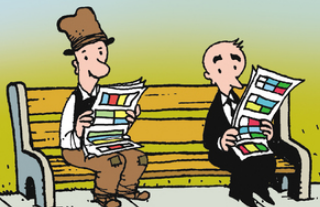CSotD: Youth and couth and suchlike
Skip to commentsFirst, this commercial, or anti-commercial, from Joy of Tech. I’m a Windows kind of guy, so I wouldn’t have known this, but Apple is getting into banking, and offering some impressive interest rates.
As this article suggests, their 4.15% rate is better than traditional banks are offering and may spark banks to raise their current rates to a more realistic and generous level. That would be good.
As the article also suggests, it allows Apple to monitor your personal finances, particularly since, in order to qualify for the accounts, you have to have their credit card and a compatible phone.
Depending on your preferred level of privacy, it could start to sound a little creepy.
I’d rather go down the street to my community bank and — while hoping they do step up the rate a bit — accept 3.5% from local folks than deal with a megabank, much less let my personal finances become entangled in the Apple network.
For those particularly concerned with such things, Megan Herbert reminds us of privacy lost and a world of complete personal autonomy.
I do miss that world, but more in nostalgia than as something I could switch to now, and isn’t it ironic that it was an apple that Adam and Eve ate that made it impossible for them to dwell in Eden?
My only real regret among those analog artifacts is written correspondence. I had a creative, articulate, imaginative friend from college who died in his (our) early fifties. We’d written back and forth for years, but my sheaf of wonderful letters from him ended when we switched to emailing each other on accounts long since updated, abandoned and lost.
The rest of that stuff? I’m not sorry to be working on a word processor, or having been able to telecommute a good job for 10 years, or being able to go wherever I want without taking vacation, since my laptop and smartphone comprise my office.
Would I live in a cabin in the woods off the grid? In my mind, sure. But in reality, it’s worth knowing that JD Salinger, much as he was noted for his obsessive privacy, used to come into town to check his mail and have a cup of coffee and chat with his neighbors, who knew him as Jerry.
To which I add that Harry Bliss, who lives in Jerry’s old place, mostly draws cartoons about a guy walking his dog in the woods, or, at best, people in quiet parks, but not often at cocktail parties or driving on busy streets.
Still, I don’t think he submits them by carrier pigeon.
Juxtaposition of the Day
Regular Readers will realize this pair tweaks one of my main rages, which is that, while we couldn’t wait to grow up and gain the privileges and freedom that came with it, there seems now to be a conspiracy to keep everyone in a state of perpetual adolescence.
I don’t recognize either the parental hostility or Jeremy’s indolence in Zits, and, specific to this particular example, my kids were eager to get not just summer jobs but jobs throughout the school year. I recall having a spat with my ex over summer visitation, since she lived in England and I felt the previously-agreed-upon month there would negate summer employment for our eldest.
I call it a “spat” because it was a self-resolving problem, and by the time little brother was that age, we all knew that kids came and went so regularly in those low-level jobs that you could always find a gig when you got back to the States.
Both boys wanted to work because (A) they wanted the money and (B) because all their friends were working and they’d have felt like spoiled jerks to sit at home. Also, they were growing up.
Which might raise the question of whether we’re supposed to like Jeremy, but, in my mind, it simply raises the question of who is paying for his auto insurance and why?
As for Danae, I’m not sure how old she is supposed to be, but, first of all, if I had had a talking horse, I’d have wanted to stay young forever, too, because, like Wendy, you get to a point where fairy dust and happy thoughts don’t work anymore.
My memories of second grade are that my plans for adulthood were to go to the NYS Ranger School, which was just seven miles away, and then be a forest ranger and live at home. By fourth grade, I’d abandoned the second part of that plan.
By junior high, I couldn’t wait to grow up, and I certainly didn’t have to prod my kids to do the same.
I doubt that Edison Lee (KFS)’s folks will have to prod him, either.
Frazz (AMS) addresses the other end of things, that part where “you drag your feet to slow the circles down.” And, as he says, you can’t slow down aging, but we have found ways to extend maturation.
Beer ads, for instance, now show young drinkers dancing and partying on the beach, whereas they once depicted adults having a quiet beer with friends, or mature people relaxing in deck chairs with a brew, often in a fluted beer glass comme il faut.
By the way, I don’t recall this 1963 ad touching off any boycotts for putting Budweiser in what was, for the times, diverse hands.
The whole world was a lot more mature back then.
Speaking of silly modern controversies, Dr. MacLeod takes a humorous swipe at a humorous development, which is that the rocketman is having a terrible, horrible, no good. very bad time with his blue checks, which he thought he could monetize to make up for the fact that his new toy is worth half what he paid for it.
Medical school students have already seen a cadaver dissected, but for everyone else, Alex Kirschner does a fantastic job at Slate of slicing, dicing and exposing the inner foolishness of the genius and his absurd situation.
Put down your coffee and cover your keyboard.
Finally today, Mannequin on the Moon (AMS) makes a sort of pun that serves mostly to touch off an earworm which I will joyfully share.
You’re welcome.











Comments 13
Comments are closed.